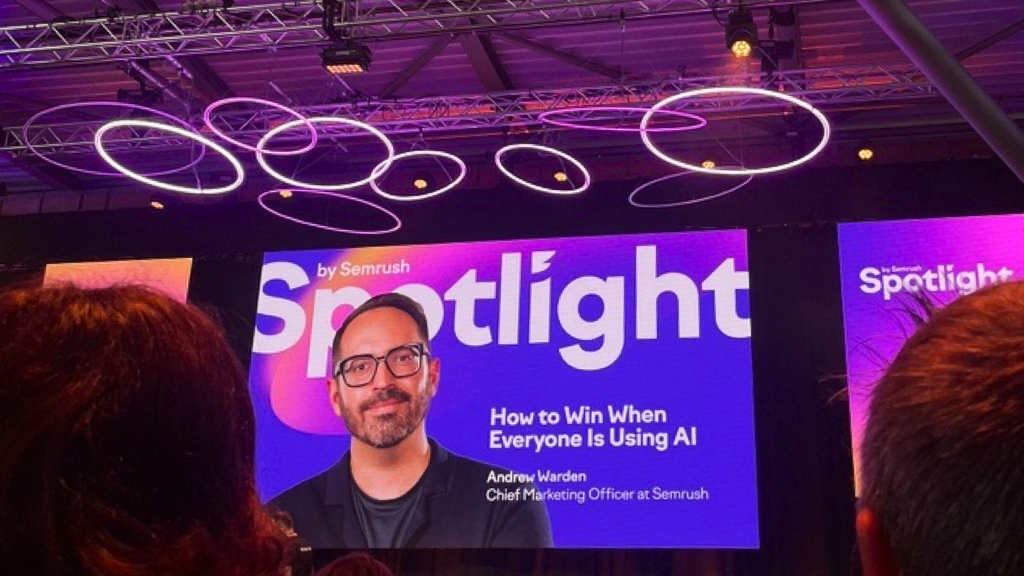AI is reshaping marketing faster than any technology that came before it. Semrush’s Spotlight 2024 brought together over 60 digital marketing leaders to discuss the future of the industry. A clear takeaway: adopting AI is essential but success hinges on thoughtful execution. As Semrush CMO Andrew Warden cautions, businesses that ignore AI risk falling behind. Yet the path forward isn’t about replacing human creativity – it’s about using technology intelligently while protecting what makes marketing meaningful.

From emotional storytelling to platform-specific authenticity, from eight-second opportunities to the power of genuine expertise, industry leaders revealed five key strategies for B2B marketers looking to thrive in this new landscape.
1. The power of real connection
System1Group’s Chief Customer Officer Jon Evans revealed a crucial disjunct in B2B marketing. While 60% of B2B advertising generates only neutral responses, campaigns that balance technical and emotional elements achieve 29% more profit growth than purely rational approaches.
This stat demonstrates that even when it comes to business decisions, we’re fundamentally human and we crave connection. To understand how this works in practice, let’s consider two contrasting approaches to launching manufacturing equipment:
1.
The rational approach leads with speed, specifications and output rates.
2.
The human approach opens by introducing a production manager who eliminated a critical bottleneck, boosted team morale and met ambitious targets using the new system – then unpacks the technical specifications that made it possible.
2. Capitalise on your eight-second opportunity
Spotlight demolished myths about Gen Z’s short attention span. The reality is that they don’t have shorter attention spans – they’re just more selective about what earns their sustained interest. And if you haven’t hooked them in the first eight seconds, they’ll keep on scrolling. Interestingly, when content does capture their attention, they’re more likely to engage with longer-form material than previous generations.
B2B brands succeeding with this audience in those crucial eight seconds understand that impact matters more than length. It’s about leading with what resonates – what transformation occurred, the real-world impact of solving the problem – before broadening the focus into technicality. It’s not a process of simplifying complex information but rather proving that you have the capabilities to share it in a digestible and engaging way.

3. Platform relevancy is everything
Former Gymshark Head of Social Elfried Samba challenged B2B marketers to think beyond their industry bubble. B2B content isn’t just competing with other business content, but with everything else in a user’s feed. On LinkedIn, you’re up against thought leadership from across sectors. On Instagram, you’re competing with personal connections and lifestyle content.
Progressive companies understand this reality and adapt their approach for each platform while maintaining consistent expertise. LinkedIn content should focus on the professional audience by sharing industry insights and technical expertise. Instagram, on the other hand, should highlight the human side – showcasing company culture and the people driving innovation. Rather than diluting expertise, it is about adapting to your target audience by creating content that complements how people think and behave on each platform. The goal isn’t to be everywhere but to be contextually appropriate.
4. Develop an authentic voice
The rise of AI tools presents both opportunity and challenge. “AI is making content generic,” Warden warned at Spotlight. His solution? Companies need a solid brand identity before they even think about AI adoption. That means developing comprehensive style guides that capture visual representation and tone of voice as well as establish distinct perspectives and consistent expertise.
Successful brands begin by clearly defining and documenting their unique identity – who they are, how they present themselves and how their story resonates with their target audience. A solid sense of identity and brand articulation provides a framework for using AI strategically. Training the technology on brand assets ensures consistent routine communications, freeing humans to focus on taking creative risks.
Companies that embrace this approach will stand out with authentic communication. Their marketing teams will spend less time on repetitive tasks and more time creating bold ideas, exclusive insights and meaningful connections.
5. Focus on value, not volume
iPullRank founder Mike King shared how Google is transforming its approach to content quality. “Information gain” – a measure of how much value a piece adds to existing content – is increasingly vital for search visibility. Simply repeating what others have said won’t cut it anymore.
Forward-thinking brands can build content strategies around four key actions by:
- Developing topic clusters that demonstrate deep expertise in your core areas
- Conducting regular content audits to spot and refresh underperforming assets
- Using structured data to enhance visibility
- Maximising ‘information gain’ by adding exclusive perspectives to every piece; whether that’s proprietary research, firsthand experience or expert analysis that goes beyond surface-level industry commentary.
The strategy is systematic. Start by mapping your genuine areas of expertise. Then, design content that combines your distinctive insights with tangible solutions to audience challenges. Ensure to update these resources regularly so that they remain relevant. Being methodical about creating value will deliver what both search engines and audiences want, which is authoritative content that brings a new dimension to the conversation.
Enhance and expand human expertise
Semrush Chief Marketing Officer Andrew Warden described the arrival of AI as “another black swan moment in marketing history.” Just as the printing press democratised written communication, radio brought the voice to mass audiences and television added visual storytelling, AI is transforming content creation. And like those previous innovations, the winners won’t be those who simply adopt the technology first but those who use it thoughtfully.
Rather than diminish the value of human expertise, AI tools illuminate what makes humanity special: our emotions, perspectives, experiences and creativity. The challenge and opportunity for B2B marketers now lies in creating space for meaningful innovation by focusing on building connections and sharing human insights, while technology takes over the routine.

